This is a topic that can be confusing for thyroid patients.
And, by the way, the information we are about to talk about applies to ALL thyroid medications even though today we are primarily focusing on Synthroid.
Synthroid is a thyroid medication used to treat low thyroid function.
While it isn’t the most popular thyroid medication (levothyroxine reserves that trophy), it’s VERY similar to levothyroxine in terms of its ingredients – both inactive and active.
And because it’s so common, there are some things you need to know about it.
Especially as it pertains to its side effect profile.
But there’s one big problem…
Most thyroid patients (and doctors, by the way) do not look at side effects correctly when it comes to thyroid medications.
Most people, when they think about side effects, consider them to be something like this:
If you take a prescription medication and you experience a negative side effect then you simply stop taking the medication or deal with it if the medication is required.
Most people view side effects in this way but this sort of thinking doesn’t really work for thyroid medications.
Unlike other medications, experiencing side effects while taking thyroid medication like Synthroid is actually very common and may not be a reason that you need to stop taking your medication.
In fact, unlike other prescription medications, experiencing side effects while taking Synthroid can actually provide you with some additional and very beneficial information.
The type of information which can go a long way to helping you feel better and get back to 100%.
Today we are going to be discussing…
- The 3 main ways that Synthroid can cause side effects
- The difference between inactive and active ingredients and how these ingredients can cause side effects
- What happens if you aren’t taking enough Synthroid
- What happens if you are taking too much Synthroid
- How to tell the difference between these conditions
- And much more
Let’s dive in.
3 Areas of Side Effects From Synthroid
You should be aware that Synthroid can cause side effects in three very distinct ways.
And, just as a reminder, the following information applies to ALL thyroid medications and not just Synthroid.
But back to Synthroid…
Because Synthroid is a bio-identical hormone, it’s not really the same as other prescription medications you might be taking.
Prescription medications for things like high blood pressure and high cholesterol are foreign to the body.
Sure, they may alter your physiology, but they are completely different from bio-identical hormones.
Synthroid contains the T4 thyroid hormone which looks EXACTLY like the same T4 thyroid hormone that your own body would produce if you didn’t have low thyroid function.
This means that, for the most part, your body knows what to do with the hormone once you ingest it and get it into your bloodstream (I use the word mostly here because Synthroid isn’t used as well as other thyroid medications).
Given this, it may make sense that the side effects you would experience when taking Synthroid should be completely different from the side effects you would experience when taking a completely foreign substance/medication.
And if you are thinking that, you are 100% correct.
There is some overlap between standard medication side effects, though, so we need to tease out the difference.
There are 3 main ways that Synthroid can cause side effects which I will elaborate on below:
#1. Side Effects from the Medication Itself or from Fillers/Dyes/Binders.
The first area should sound familiar to you.
Like other medications, taking Synthroid can cause side effects that are directly related to the medication itself.
These side effects are separate and distinct from the DOSE (which we will discuss in detail below).
These side effects tend to be related to the medication itself and are often related to a combination of the active and inactive ingredients found inside.
If you aren’t aware, here’s a crash course on the difference between active ingredients and inactive ingredients.
Active ingredients are those ingredients that actually have the desired effect that you want from the medication.
In the case of Synthroid, the active ingredient is thyroxine or T4.
But all prescription medications also contain inactive ingredients (1).
These inactive ingredients assist in the manufacturing process, help stabilize the active ingredient, and may serve other purposes such as delaying absorption or assisting with rapid absorption.
In the case of Synthroid, these inactive ingredients (2) include things like:
- lactose monohydrate (YES, this is lactose)
- acacia
- confectioner’s sugar (with corn starch)
- magnesium stearate
- povidone
- talc
- Various dyes and or color additives based on dose such as yellow No. 6, Red No. 40, Blue No. 2, Yellow No. 10, Red No. 27 & 30, Blue No. 1, and many others
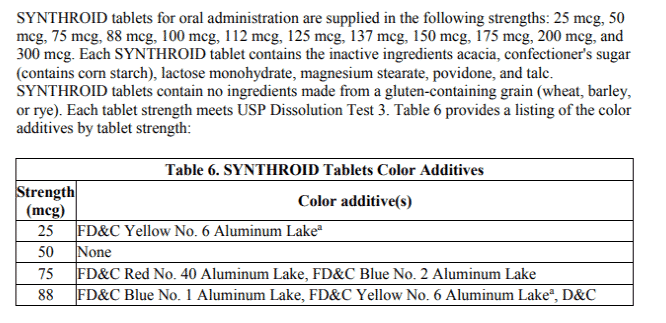
As you might have already imagined, it’s quite possible for you to ALSO react to THESE ingredients.
I mean, look at the list.
Lactose makes an appearance!
How many of you reading this don’t tolerate dairy products very well? Probably many of you.
The side effects you may experience from these inactive ingredients are completely different from the active ingredients!
But you need to be aware of both.
You’ll know if you are reacting to these inactive ingredients because you may experience any of the following symptoms:
- Hives
- Rashes
- Flushing
- Swelling
- Intestinal pain – Taking your medication should never HURT your stomach
- Nausea
- Vomiting
- Sore Joints
- Unexplained Fevers
- Wheezing
These side effects are almost always from the inactive ingredients are represent a sensitivity to those ingredients (3).
One last point I want to mention here before moving on is that Synthroid can cause directly cause hair loss.
It’s not clear where exactly this side effect comes from, but you should be aware that it can exacerbate hair loss independent of the dose that you are taking.
#2. Side Effects From Not Taking Enough.
These next two sections are DOSE related.
This means that any of the symptoms you experience in these sections are either because your dose of Synthroid is NOT enough or because it is TOO much.
Remember:
Synthroid contains the exact same hormone that your own body is capable of producing.
So as long as you are taking enough of it, it should be sufficient to reduce or eliminate your low thyroid symptoms (this assumes that your body can use completely and efficiently use Synthroid which isn’t always true).

It is very possible that Synthroid is the right medication for you, but you are, perhaps accidentally, blaming your low thyroid symptoms on your medication.
Either because your thyroid symptoms are worsening, or because your dose of Synthroid is not enough to keep up with the demand from your body.
How do you know if your dose is sufficient?
Start by asking yourself these questions:
- Do you feel like your energy has improved since you started taking Synthroid?
- Have you lost weight or has your weight stayed the same since starting Synthroid?
- Have you noticed an improvement in the quality of your hair, skin, and nails since starting Synthroid?
- Have you noticed an improvement in your mood since starting Synthroid?
- Has your menstrual cycle become more normal since starting Synthroid?
- Have you noticed a decrease in joint pain since starting Synthroid?
- Have you noticed more regular bowel movements or reduced constipation since starting Synthroid?
You should have answered yes to the questions above.
Put in other words, you should see SOME improvement in your low thyroid symptoms about 6 to 8 weeks after you start taking Synthroid.
Some improvement is a good sign and it means that your body is able to use the medication you are giving it.
But if you aren’t getting back to how you felt BEFORE you were diagnosed with your thyroid problem then you aren’t quite where you need to be.
If you see even minor improvement,(and assuming you aren’t experiencing the side effects from section one) then it’s highly likely that you are simply not taking enough or that your dose is too low.
But what if you haven’t noticed any improvement or if your symptoms actually got WORSE around the time you started Synthroid?
This is a different problem entirely and is usually related to how efficiently your body can or can’t use the medication.
In cases such as these, it’s almost always preferable to try a completely new thyroid medication which you can read more about here.
#3. Side Effects From Taking Too Much.
The next section is basically the exact opposite when compared to section #2.
Just like it’s possible to not take enough, it’s also very possible that you are simply taking TOO much.
And, believe it or not, this happens quite frequently.
Due to genetics, some people are far more efficient at others than using certain types of thyroid medications.
Some people, people I like to call super converters, can take Synthroid and very efficiently activate it and use it in their body.
For these people, it’s actually easy to take too much.
It’s also possible, for various reasons, that your doctor accidentally just gave you too much.
Whether you are just really good at using it or your doctor gave you too much, there are certain side effects that you may start to experience in these settings.
These side effects include:
- Tiredness
- Irritability
- Sleep issues
- Shakes/Tremors
- Nervousness
- Hair Loss
- Muscle Weakness
- Fertility issues
- Rapid Heartrate
- Heart palpitations
These side effects all have one thing in common:
They occur because your body is getting too much Synthroid and too much thyroid hormone.
These are the exact same symptoms that patients experience when they are hyperthyroid, by the way.
The solution for taking too much Synthroid is to simply reduce your dose.
That’s it.
Switching to Another Medication
What are your next steps if you find that you are experiencing side effects while taking Synthroid?
The answer really depends on what type of symptoms you are experiencing, the severity of those symptoms, and where they are coming from.
But what if you are experiencing symptoms from the inactive fillers, binders, or dyes in Synthroid?
What if you just can’t seem to dial in your dose and you seem to experience fluctuations in symptoms no matter what you do?
What if you’ve been playing around with Synthroid for years and years and you can’t seem to feel better?
At some point, you may want to seriously consider switching thyroid medications entirely.
And I have great news for you:
There are MANY different thyroid medications available outside of Synthroid and levothyroxine which, in my opinion, tend to be far more effective.
These medications include:
- Armour thyroid (I’m omitting WP thyroid and Nature-throid here due to their recent recall)
- Cytomel
- Liothyronine
- Tirosint
- Tirosint-Sol
- Compounded T4/T3 thyroid medications
- SR T3
Switching to a completely different thyroid medication isn’t always easy but if it means the resolution in your symptoms and side effects then it will no doubt be worth it.
Final Thoughts
Synthroid is a popular thyroid medication used to treat low thyroid but can carry with it many different side effects.
These side effects are either associated with the dose of the hormone but they can also be secondary to the inactive fillers, binders, or dyes found inside.
Identifying which side effects you are experiencing and what is causing them can help you determine whether or not Synthroid is working for you.
If you find that Synthroid isn’t working for you you have plenty of other additional options to choose from!
Now I want to hear from you:
Are you currently taking Synthroid and experiencing any side effects?
If so, what side effects are you experiencing?
Do you think your side effects are dosed-related or inactive ingredient related?
Are you thinking about switching thyroid medications cause of your side effects?
Leave your questions or comments below!
Scientific References
#1. https://www.ncbi.nlm.nih.gov/pmc/articles/PMC7122736/
#2. https://www.rxabbvie.com/pdf/synthroid.pdf
#3. https://pubmed.ncbi.nlm.nih.gov/31126513/



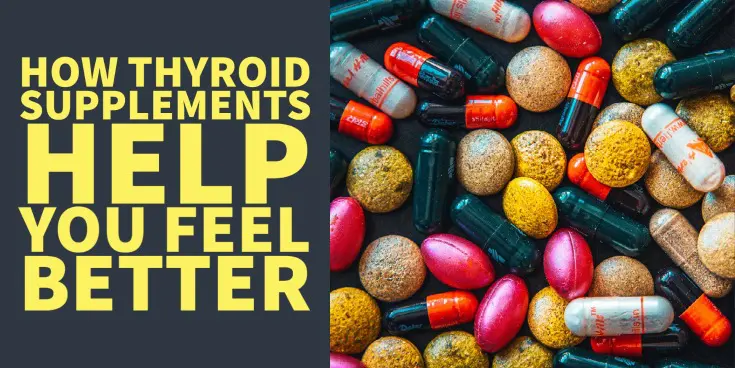
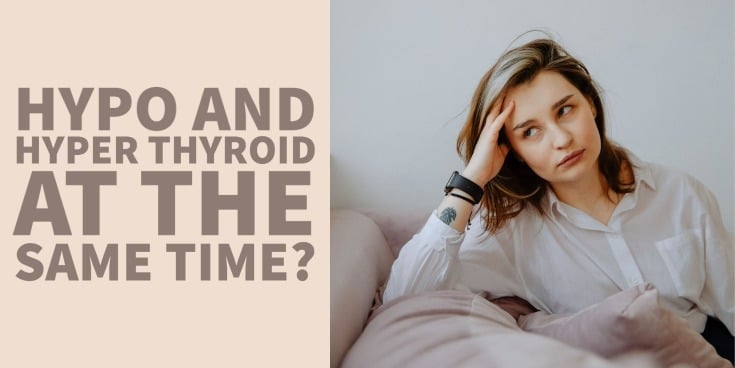
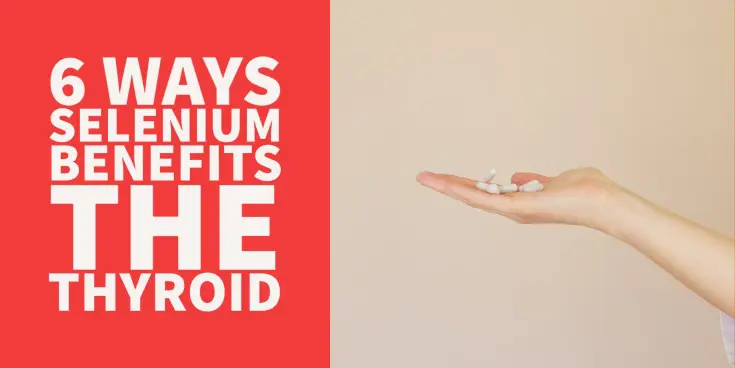


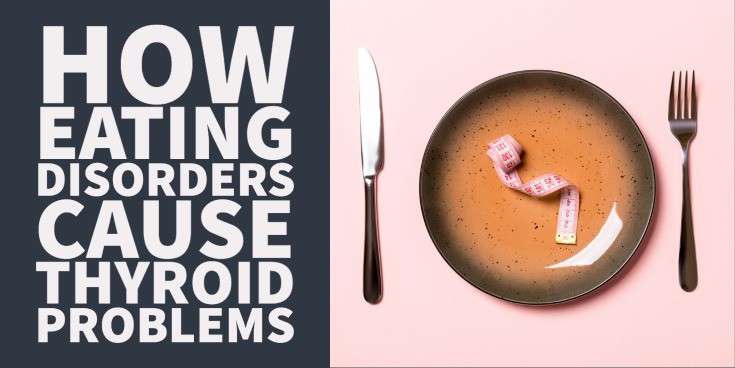

Is it normal to have a free T3 to reverse T3 ratio of .38 (good) and a serum leptin level of 39 (not good) and not be able to lose weight? Shouldn’t my high T3 make the weight fall of? Most of my other hypo symptoms have subsided except for weight. Thanks in advance for any response!
I’ve been taking synthroid for 2 yrs now & I experience every all of the Symptoms from taking too much except I also have went up 13 sizes in my weight in just one year I need to know what is going on with me, but I haven’t been on the same dose the whole Time it has increased over the years so I don’t understand why it’s doing this to my body I also take Cytomel with this
In May 2012 I was diagnosed with stage IV Papillary Thyroid cancer. In June I had an 8 hour surgery, the Dr removed all of my thyroid and a portion of my parathyroid. After a biopsy there was “tall T cell” which I was told would need additional aggressive treatment. I then underwent internal radiation followed by external beam radiation.
Since then I have been on synthroid. I have experienced fatigue and joint pain that has gotten worse every year to he point I have reduced my work by 75%.
I hope the product I ordered, Glandular thyroid + dedicated thyroid helps me. I will be sure to share my results.
Hi Tony,
Yep! You are on the right track with Thyroid Glandular+ 🙂 You may ultimately need more supplements but that is a good place to start.
I had Graves and it was irradiated 19 years ago. I gained over 100 pounds shortly after that was done. I am now on synthroid at 175 mcg . I was able to lose 43 pounds in 4 months on a keto diet. After 4 months, My body could not lose another pound. After a month, I stopped trying because I felt maybe at 65, I needed to just maintain. I went from 240 to 197. I am 5 1/2 feet tall. I got TSH tested a few days ago and it is so low that it is not in range at .092. I feel tired and have plaque psoriasis on my my hands and eczema. I never had that until I lost my thyroid at age 44or45.
Would I do better with Tirosant or compoundded t4/t3 ?
Hi Angela,
It’s impossible to guess which one would work best so you’ll just have to start one and see how it works. If it doesn’t work well then you can swap to the other.
Has the product worked for you?
Hi, I had 1/2 of my Thyroid out in 1997 and in about 2005 had a Parathyroid Surgery, I was on Synthroid since 1997. About 8 Years ( 2013 ) ago my Dr. did the Thyroid Test and it came out that my Numbers are good and I don’t need the Synthroid Meds anymore. I didn’t believe my Dr. so I whent to a Thyroid Specialist and she confirmed thesame . So I am OFF Synthroid Meds since about 8 Years. I am fighting with my weight and I am very quickly irratable and short Tempered. Could it be that I need to be on the Medication again ??? But my Weight is my biggest Problem, I am 5’4” and weigh now 165lb and I am misserable. What is your advice on this??? Thank you very much for your time,
J.Mestas
Hi Jutta,
It definitely could be! The best way to know for sure is to get retested and include all of your sex hormones including estrogen, progesterone, testosterone, cortisol, insulin, thyroid hormones, etc. You can read more here: https://www.restartmed.com/lab-tests-every-thyroid-patient-needs/
I have been on Synthroid (50 mcg) for about one year now. The dose was less, but the doctor changed it to a higher dose because I wasn’t feeling great, and I think was always tired also.
I am now so tired as well as dizzy and have no energy…..not good, as I want to work. My last test about 3 weeks ago indicated I was low on T3.
The doctor never gave me the results — I had to ask him for it. He said it was “normal”…….and I said but “I saw the results that were emailed to me when I requested, and T3 was low”. He said “Oh that’s nothing”.
Could you recommend a Thyroid Specialist in Beverly Hills, California ?
Many thanks
Hi Joan,
I don’t know anyone there to recommend but you can use this resource to help! https://www.restartmed.com/how-to-find-a-doctor-to-treat-your-thyroid/
Hi. I just started synthroid 25mcg 3 days ago. I have metallic taste in my mouth. So far that’s the only side effect. Is this bad? I just was on np thyroid for 18 days. The first 4 days I was ok then got sore throat and a hoarse voice which I took allegra for and was better next day. Then I kept feeling good then bad. Finally felt like I was going hyper .
Hi Julie,
The metallic taste in your mouth may be acid reflux. It’s possible your thyroid medication is causing that.
Have you anywhere addressed how to avoid getting acid reflux from thyroid medication?
Hi Susan,
Not exactly but this article is certainly related to that idea: https://www.restartmed.com/acid-blockers-thyroid-problem/
I had a total thyroidectomy in 2008 due to goiter and “suspicious” nodules. Never had a problem with weight, fasting blood sugar, lipids, or blood pressure until after thyroid removal and started on Synthroid. Diagnosed with NASH in 2014. Still on Synthroid and I experience symptoms of diabetic neuropathy every morning when I take Synthroid (100 mcgs) on an empty stomach. Endo says that can’t be possible due to A1C 5.2 and FBS 91. I also experience right flank and right back pain when I take the medication. I’ve had numerous endoscopies all negative and therefore it must be the medication. Really wish I could find an Endo willing to use just T3 but they site my age,63, as a reason for not doing so.
Hi Lei,
If you are unable to get on a T3 medication then you may want to try something like Tirosint or Tirosint-sol. Switching to a different type of T4 med may be the solution.
I’ve been taking NP Thyroid for several years. Recently I’ve had rapid heartbeat. It spiked 17 times in the two weeks I wore a heart monitor. It also spikes when I walk on a treadmill at the gym, up to 239. I finally agreed to take the calcium channel blocker the cardiologist prescribed, but before taking the first pill I took my blood pressure several times. It is very low. Now I’ve been told to record my BP morning and night for seven days then the doctor will decide what’s next. Diastolic has been consistently below 60, as low as 48. Systolic has been as low as 85. Could this be a thyroid medication problem?
Hi Diane,
It’s a possibility but I would say it’s not likely.
I took Naturethroid at 1 grain for about 6 years without any side effects or challenges. Since it went south on me resulting in massive hair loss and joint pain I have been unable to make another medication work. It’s like I’m stuck. It seems the synthetic ones cause leg achiness when I sleep that stops when I stop taking. Armour caused breathlessness and a cough. On tirosint 13mcg right now with slow release 2.5 mcg of t3 and have the leg pain, trouble sleeping and extreme fatigue. I haven’t been able to get above a 1/2 grain equivalent of anything going on two years now. How can I determine what the problem is? Labs always look a little hypothyroid.
Hi Lynn,
I would give compounded NDT a try. You can get the same ingredients in Nature-throid from certain compounding pharmacies.
I have tried it and it doesn’t seem to work. Has same bad smell that NP has. I wish someone could explain that new smell (seems more like ammonia than “pig” smell that it all had for years.
Hi Lynn,
Many people have contacted the manufacturer to try and figure it out without much luck. There are many theories but I don’t think anyone knows for sure.
Hello! I was taking 12.5 mcg of Levothyroxine. Because I still didn’t feel good, dr switched me to NP Thyroid. In order to switch over, I had to take 30 mg of NP Thyroid and 12.5 mcg of Levo. While on this combination, I felt the best I’ve ever felt since having half my thyroid removed. Due to stomach issues though, Dr took me completely off Levo and started me on 30mg Np Thyroid. Within 2 weeks, I started feeling terrible, and having extremely dry eyes. The drs solution was to increase meds. I am now on 45 mg of Armour. I couldn’t stand the way the NP tasted or smelled, so they changed me to Armour. My question is, have you heard of experiencing extremely dry eye after switching meds, and if so, what can I do? I am in pain and feel as if it’s worsening. Thank you.
Hi Tabitha,
That’s not a symptom I’ve seen related to thyroid medication.
I am on Armour and have sore eyes ever since I have been on. it besides all the other side effects and only on 65mg and split dosage .Just feel awful on it. I miss nature throid.
I have been on .137 mgs of Levothyroxine and some months ago, I added 5 mcgs of Liothyronine, and I just don’t feel like it’s doing much. My energy and enthusiasm is low. I tend to not sleep soundly and wake up tired. I have been losing my hair at an alarming rate. In a year, I will be bald. I have mild chronic depression and heart palpitations and irregularity in my heart beats. I would prefer to take a more natural Thyroid supplement but at this point, I’m confused as to how to proceed.
Hi Jonathan,
I would recommend looking at these resources:
https://www.restartmed.com/increase-free-t3-naturally/
https://www.restartmed.com/product/t3-conversion-booster/
I was taking synthroid and I believe I was having side effects from the fillers. I am now on Liothyronine and Tirosint and am doing really well on these! I am actually on a lower dose than I was on the Synthroid!
Hi Cyrstal,
That’s great! And that story is fairly standard among people who make the switch 🙂
I’ve been on thyroid meds for 20 years. Most of those years was Synthroid (the generic version sent my numbers crazy) alone.
My DHEA was low so I was taking Keto 7 for the dhea. Well my labs showed that my thyroid was being over treated. My dr has me currently on 75 Synthroid and 30 Armour.
I feel awful. I can’t even explain it other than to say that I feel feverish and achy without a fever. I’m fatigued and foggy and no energy. Hair and nails are a given. Full disclosure I also have iron deficiency anemia. I had two infusions 6 weeks ago and thought that would take care of feeling so lousy. But I’m still doing awful. I’m guessing it’s my thyroid or low D?
Hi Michelle,
Priority should be placed on improving your ferritin status because that will impact your thyroid. Fix your ferriting then optimize thyroid function.
My doctor doesn’t listen to me at all. Doses strictly on TSH. My TSH right now is .006. But I take Cytomel and my TSH is always artificially low when taking it. My reverse T3 is 23 and won’t come down. Dr. did the opposite of what is needs to bring it down-took away one dose of Cytomel and still wanted to reduce the Synthroid. I wanted to increase cytomel and then reduce synthroid-very slowly. My weight just keeps going up, my cholesterol is out of control (even with a major diet change in May-no red meat, no sweets, no cheese, very little dairy). And my blood pressure is now high. And , on top of all of that, I’m now taking anxiety meds. I know if I could get the right dosage of Synthroid and Cytomel these issues would most likely resolve. I have not found a doctor in my area that will listen, including the so-called best endocrinologist in the city. I’m exhausted, mentally and physically and just can’t fight for myself any more. Help.
Hi Lisa,
The best help you can get is to find a doctor that is actually willing to treat you! Please see this resource: https://www.restartmed.com/how-to-find-a-doctor-to-treat-your-thyroid/
I had my thyroid removed 15 yrs ago. I have been on a roller coaster ride ever since. Seen 7 doctors, 5 specialist and 2 MD’s without success. I have been hypothyroid and hyperthyroid due to prescribed meds. I have taken every synthetic thyroid meds made plus Armour with terrible side effects. haven’t felt well for 15 yrs. I have experienced it all. Numerous labs. I have only been within range twice. My recent labs reflect I’m within range on the lower side. I’m on NP currently. Being within range still experiencing brain fog, tight hand, hurting arms and weak legs, plus not feeling well. One week I take 2-1/4 gr 5 days & 2 gr remainder of the week. following week; 6 days 2-1/4 gr & 7th day 2 gr. I alternate this dosage. where do I go from here? Interesting ha!
Hi Roy,
I would try to optimize your dose to get to the levels mentioend here: https://www.restartmed.com/normal-thyroid-levels/
Hi,
I am 67. I have been on thyroid meds for 40 years – taking levo then moved to Euthyrox when GlaxoSmithKline discontinued Eltroxin where I live. I had very bad side effects from Euthyrox and switched to Synthroid. Been taking Synthroid for 3 and a half years and all was well. I am very into sports and running. In April while I was running I experienced a very rapid hear beat and nearly collapsed . Went for all cardio tests. Echo Stress, MRI, and catherization. Four cardiologists told me that my heart is fine it is the Synthroid. Now I constantly feel like I have a vise on my heart and chest heaviness. Now I cannot walk more than 10 minutes without experiencing muscle pain in my feet and chest pain. I feel lousy. Doctor is experimenting with changing my dose to no avail. I take 75mcg a day and TSH is 2.18, FT4 is 21.3 and FT3 is 4.64. Have you heard of people not being able to walk while on Synthroid? (Took Tirosint sol for one day and it caused very rapid heart beat and feeling like I was going to get a heart attack.) Any ideas? Thanks, Leslie – a devoted follower of your videos.
Hi Leslie,
I have not but something like a beta blocker would probably fix that issue.
I was diagnosed with Hashimoto in March TSH of 24, Dr put me on 50 Levo. The first 3 weeks I felt great. Then everything went really bad. I couldn’t drive, couldn’t walk straight, rapid heart rate, severe panic attacks, (I have never had anxiety or panic attacks in my life). Dr said it’s not the meds, and put me on zoloft, I refused to take it, because I felt like it would only mask my symptoms. Finally after 3rd trip to ER thinking I was having a heart attack, she told me to stop taking and see her assistant in 6 weeks. Symptoms were gone in 2 weeks. Then I started feeling awful from my thyroid symptoms again. I went to see another Dr. and they put me on the lowest dose of Armor thyroid. I could not take that either, chest pain, rapid heart rate, and headaches. So they switched me to brand name Snythroid 25. It seems that I can only tolerate 1/2 of a pill for now. After 4 weeks of taking that my heart rate is increasing again and having panic attacks. I stopped taking for 3 days and started back up again, seem ok right now. I am so frustrated that I can’t seem to tolerate any of this medication, however I know my body needs it. Please Help!
Hi Heather,
I would give Tirosint a try: https://www.restartmed.com/tirosint/
I have Hashimoto Thyroiditis and have switched medications 5 times. Apparently, I am very sensitive to T3. So now I am on Tirosint and Cytomel. I feel good but my biggest side effect all along has been hair loss. Can’t seem to get that corrected no matter what I do.
Hi Sandy,
Please see this article for more information on managing hair loss: https://www.restartmed.com/thyroid-hair-loss/
Good morning. I have been up and down with this thyroid issue! Switched to Tirosint a few months ago went from 150 mcg now to 75mcg. I feel like crap. My PA in a functional medicine practice tells me it’d not due to thyroid and my labs look great! I keep telling him…well I’m glad I look good on paper! I have suggested compounded T3 T4. As of yet, he’s not going for it. Says I convert fine and levels look good. Living with fatigue/brain fog/dizziness for the last 13 years is getting old.
Hi Melody,
I would strongly suggest checking out this article for more information! https://www.restartmed.com/normal-thyroid-levels/
Hello,
I was on nature thyroid and felt great lost weight, had so much energy could go all day on the move, since being recalled I have tried a levothyroxine, synthyroid and now on a compounded t3/t4, I still feel like crap, no energy, no motivation, weight gain like 25 lbs in a year, I am taking one of your thyroid glandular capsules once daily at lunch, not feeling much different! Help me what can I do?
Hi Lori,
Please see this page for a list of medications that are still working: https://www.restartmed.com/thyroid-medications-that-work/
Thyroidectomy June 2, papillary cancer in all 4 nodules.
I m on 50 mcg Snythroid. . My dr is ill and away for3+weeks. These were Taken at 6 weeks on the 50 .
It’s hard to get into a dr, clinic has not replaced a new dr yet.
TSH 2.42 0.35 -5.00
T 4. Free. 11.9 range in Canada 9.0 to 19.0
T. 3. Free. 3.2. 2.6 to 5.7
Cortisol 193 .0. nmo/L. Ref range AM 138-690
Prolactin. 4.0. Range 1-2 to 29.9
Progesterone less then 0.64
Vit B12. 346.0
Testosterone. Less than .69. Range 0.69 to 3.70
Magnesium. 0.80. Range. 0.70 to 1.10
Calcium 2.41 range. 2.14 to 2.66
Iron 9.3. Range. 7.0 to 32.0
Iron saturation 15.0%. Reference 15-50
Iron binding capacity. 61.3 Range 45.0 to 80.0
Parathyroid hormone intact 5.8. Range 1.6 -7.2
I was to talk to my GP about bio-identical hormone and whether any other changes to be made
My thyroperidase Ab less then 10
Thyroglobulin Ab less the 20
My TSH has alway been less then 0.20 not sure why higher after last tests.
If you can be of any help I would appreciate it. Waiting list for endocrinologist in Saskatchewan is up to 2 years
Hello Dr. Childs,
First of all I want to thank you for all the great and helpful information you put out there for so many people that are struggling with this issue.
I got diagnosed with low thyroid and hashimotos in 2017 after my last child was born. (How I was diagnosed is a story for itself.)
I was working with a naturopath (as my doctor would not provide any help because my TSH was not high enough in her opinion. – I think I started with a TSH of 3.8 something and it eventually want up to over 4). I had all the symptoms. Random and unexplained weight gain, hair loss, low energy, mood swings, brittle nails, etc. Long story short and fast forward to now, I was taking Desiccated Thyroid medication for about a year now (give or take), and also played with higher and lower doses over time, but my symptoms would not really go away. One thing I especially noticed was the huge amount of hair I was loosing every single day, and especially during and after a shower. So about 3 weeks ago, I ran out of my meds and decided to stop taking my them and just focus on my supplements for now (taking your thyroid and adrenal reset complex and the thyroid hair supplements amongst other supplements). I have noticed that my hair loss is gradually becoming less and less. I’m still losing more than I would like, but for the first time since I was diagnosed, I’m finally hopeful again that my hair will regrow. I hope the issue will subside completely and hopefully I will be able to handle my symptoms with supplements alone. Is there anything else you can recommend? My weight is not a super huge issue, but it doesn’t want to go down all the way to pre pregnancy weight. I have always been able to loose all the weight within a year at the most and it’s been 4 years and I’m still not down all the way. Any help and suggestions is greatly appreciated!
God bless you!
Hi Helen,
I would say the first place to start is with a complete hormone analysis. That information will then help you determine what areas you should be focusing on 🙂
Wondering if I can have hyperthyroid symptoms with a normal TSH. I had my thyroid irradiated in 2019. Then, after going into hypothyroid and starting on Levothyroxine I have continued to have symptoms/side effects of hyperthyroidism with normal TSH. My doctor switched me to Synthroid because of the inactive ingredients in Levothyroxine and it hasn’t really helped. Thus I have had to continue the Propanolol I was originally prescribed when I was hyperthyroid. So after about 9 months of taking both Synthroid 125 and Propanolol I was feeling ok until I went into hypothyroid again with TSH 5.6. My doctor increased my Synthroid to 137 and I am MISERABLE!! I have palpitations, heat intolerance, extreme irritability, insomnia. I’ve since had to increase my Propanolol dose but after about 8 weeks it’s just continuing to get worse. I just got my TSH drawn and it’s normal 3.76 T4 1.28. My symptoms of irritability are worse my heart is beating out of my chest and my muscles are getting weak. My doctor is working me up for other things, however I’m convinced this is related to the Synthroid dose change. Is this possible?? Could these be side effects from the Synthroid??
Hi Rebecca,
It could be. Some people are sensitive to different types of thyroid medication regardless of the dose. It’s uncommon but it does happen. It’s also entirely possible that your symptoms are unrelated to your thyroid medication. You’ll need testing to figure it out.
Hello Dr Childs, I had hormone problems immediately after having my last child at 34 yr. In my 50’s, I was diagnosed with Hoshimotos. I was taking 37.5 mcg of synthroid. I have most of the symptoms. I believe I got inflammation from the last covid vaccine. I went to a Functional med doc last year. He put me on more iodine. I have a goiter and nodules. I went to an endocrinologist last fall. Then to Ultrasound. I have larger nodules. 2 were biopsied on 2-7-23. The endocrinologist says I was diagnosed incorrectly with Hoshimotos so he took me off the meds. The aspirates show a moderately cellular collection of follicular clusters with Hurthle cell features. Given the presence of background lymphohistiocytic aggregates consistent with lymphocystic thyroiditis, the changes are favored to be reactive in nature. The FNA was diagnosed as benign with the above in comments. So do I have hypothyroid or hoshimotos. He has done nothing for me. I am not sure which way to turn at this time. I have been taking your T3 Conversion Booster and thyroid reset complex. I feel like I need more. My cholesterol has been high for years and keeps going up. I don’t handle statins well. What do I do about the thyroiditis? Please help
Hi Linda,
I would recommend checking out these articles which contain a number of treatments that can help your thyroiditis:
https://www.restartmed.com/natural-remedies-for-hashimotos-thyroiditis/
https://www.restartmed.com/natural-thyroid-remedies/
I am 60 YO. I have had Hashimoto’s for 30 years. I am taking Synthroid 75 mg and cytomel 5 mg. I still have low energy, peeling weak nails, thinning and dry hair, brain fog, constipation, and recently weight gain and high cholesterol. My thyroid is almost nonexistent according to ultrasounds. I have been a gym rat for longer than I have had thyroid issues. I eat mostly healthy foods, am gluten free and exercise 5 days a week. I am not sure which ingredients are giving me side effects. I would love to try a new medication but my dr. Is not the experimental type. Medications and supplements impact me quickly even in small doses. I recently purchased your thyroid vitamins but am starting out with 1 capsule a day because of how every supplement and medication affects me. My dr. Recently joined a hospital after being in independent practice and now doesn’t “listen” to my symptoms complaints like he used to. This causes feelings of helplessness. I enjoy your website immensely. Thank you!